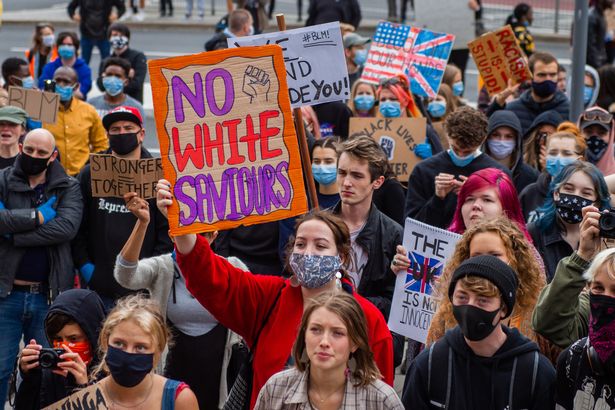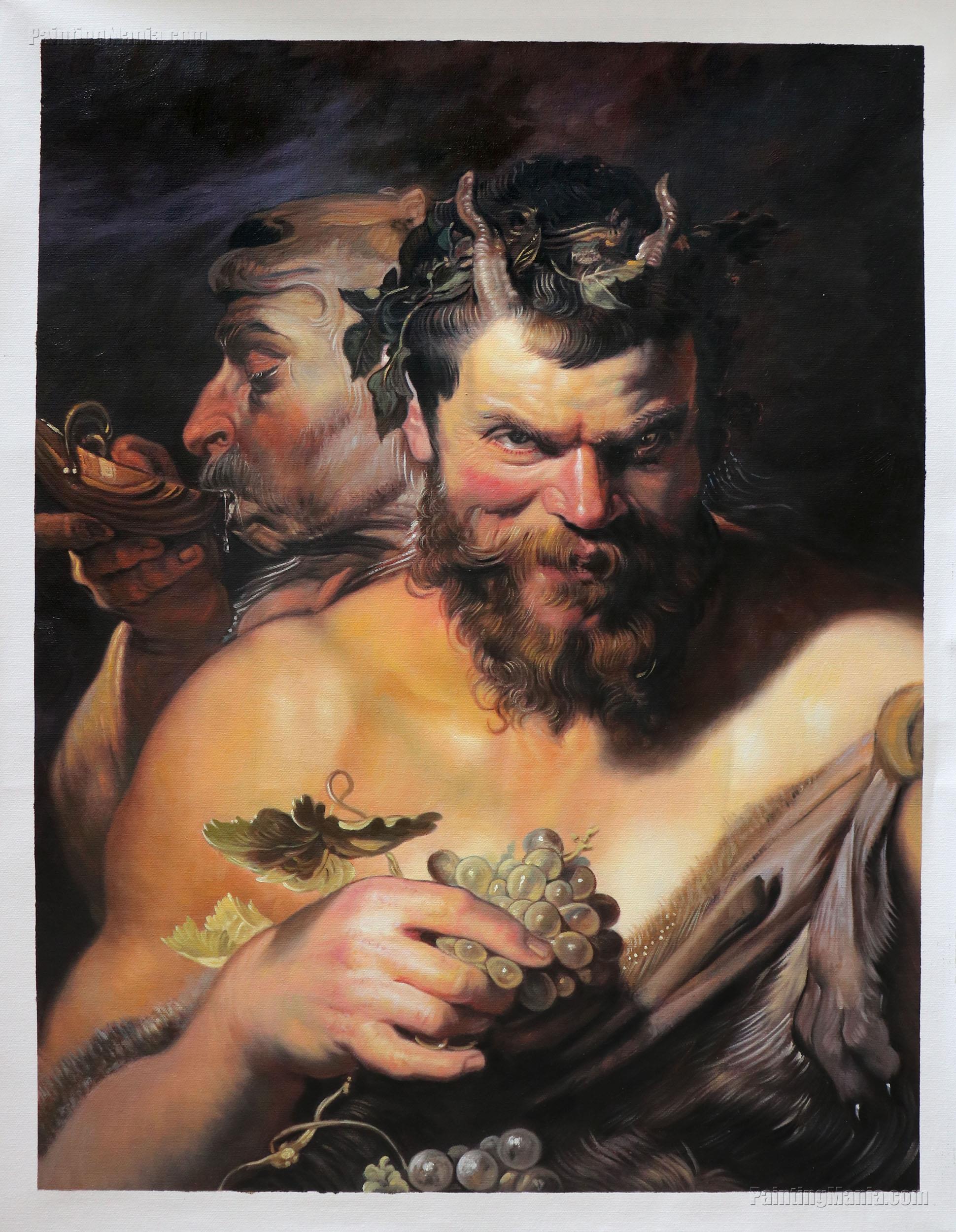
No one should get any points these days for noticing the religious underpinnings of Wokism; to miss its religious fervor, you would have to be allergic to the general concept of noticing. Activists (votaries) in Seattle have established an autonomous zone (monastic polity) and are busily adorning its walls and doorways with BLM-cum-Antifa imagery (iconography). From Seattle’s Brave New Municipality emerge stories of values-based evictions (purges) and forced donations (tithes), all conducted under the approving gaze of academics (preachers) well-versed in the relevant literature (doctrine). Foot-washing is back en vogue, but this time in .mpeg format. The cultural revolution of 2020 is Calvinism with consumerist sprinkles; its cheerleaders, Calvinists with MacBooks.
"The cultural revolution of 2020 is Calvinism with consumerist sprinkles; its cheerleaders, Calvinists with MacBooks."
New religions are hard to spot. The difference between Jesus the egalitarian revolutionary and Jesus the prophet is easier to discern with the benefit of two thousand years of hindsight; it took many decades for Mohammed’s Abrahamic political—and militant—movement to be construed as a faith in its own right. Fervor aside, the conceptual threads tying Wokism to its crustier fellow religions are evidently not visible to everyone. Nonetheless, certain terms near-perfectly describe the events of recent weeks, but are suspiciously absent. What follows is a working glossary of the unsaid.
1. Genuflect
As any good Christian knows, genuflection is the lowering of the body onto one knee—two, in the Orthodox tradition—accompanied by the bowing of the head, an action embodying the lowering of the spirit in deference to a higher power. This particular combination of muscle motions is pretty specific. Unless you are fishing for that last packet of own brand produce at the back of the lowest shelf of your local supermarket, genuflecting is not something the average person often does; it is an event you would normally notice. And yet, nowhere is the ubiquitous “taking a knee” described as genuflection, even though the two gestures are almost identical. The sole distinguishing feature is the absence of the sign of the cross; and even here, a new vernacular of the hands has emerged to replace it. When various politicians, police chiefs, CEOs and academics style out their contrition, the hands must be placed, with thoughtful reverence, just so. Just like at mass, nose-scratching is verboten. If the symbolism were not clear enough, U.S. Democrats have added a stole of Kente cloth—in Nancy Pelosi’s case, adding so much liturgical weight that it became the straw that broke the camel’s knee.
So why not just say “genuflect,” when the word was developed for precisely this activity? The answer must lie in the higher powers in question. The Christian act of genuflection is submission to a forgiving god, but the god of “taking a knee” never seems to be in the mood for forgiveness. In botched attempts at staving off civil disorder, police officers have apparently been advised that they may “take a knee” in front of protestors to demonstrate their solidarity with The Cause. If they expected forgiveness, they were doubtless disappointed. Just like the Dean at Evergreen University who lowered his hands when accused of “microaggression”— and was met with hoots of derision for his troubles—the response is not so much thank you as fuck you. The god of the cultural revolution wants blood and vengeance, and physical submission won’t buy him off. When the Wokists genuflect, we should call it just that: otherwise, we are conspiring in the lie that there is no higher power involved.
2. Iconoclasm
It is astonishing how few people are using this word at the exact moment that it is more useful than it has been for decades. If “iconoclasm” did not emerge to describe the toppling of statues and defacing of monuments, why have it at all? Yet the word is absent from the discourse. 2020’s iconoclasm follows a well-worn path: start at the objectionable and proceed towards the absurd. The tearing down of Edward Coulston’s statue in the English city of Bristol has a far sounder justification (his central position in the slave trade) than does the defacing of the Cenotaph (a generalized and free-floating anti-imperialism which can land, spore-like, on almost anything); from there, the iconoclasm moves on to more and more questionable targets, including famous racists such as Gandhi. Only a shoulder-brush with the history of communism is needed to predict where this will end.
The media, however, have preferred to use other terminology, more circumspect and distinctly less philosophical. There is no shortage of verbs to describe the activity itself—toppling, pulling down, tearing down—but no noun to denote its ideological basis, despite the fact that “iconoclasm” fits the bill exactly. The use of the word would not only provide terrifying echoes of iconoclasms past, but inconveniently point out the fact that iconoclasm replaces a something with a nothing, a statue with a plinth. In the breathless titillation provided by the topplings, there seems to be less interest in the topic of what will take the place of the toppled, even though there is no shortage of suggestions from the Twitterati. Describing movements like “Rhodes must fall” as iconoclastic would not only have the benefit of pointing out their religious nature, but might also call attention to the fact that a new iconography is waiting in the wings, whether you like it or not.
3. Original sin
Well, technically, original sins, in the plural. The biggest and baddest of these is whiteness, but others bear mentioning: we must always guard against our cisnormativity, for example, or our patriarchal instincts. In a surprise twist at the end of Wokism’s series one finale, the accusation of heteronormativity fell out of favor: after a number of unfortunate fender-benders with trans rights, gay rights have become a bit passé. See also: feminism. But each of these original sins coagulate to form a giant blob of original sin, a universal, metastasizing wrongness which can never be expunged, only mitigated. Like original sin, cisnormative patriarchal whiteness lives within each of us. Don’t think that your skin pigmentation will absolve you. Kanye West, Candace Owens, Esther Krakue, and Zuby all have an internalized whiteness so blinding that their brown skin tones become nothing but book jackets. Dave Rubin and Peter Thiel’s homosexuality is, and always was, a front: a trick of the devil to disguise an inner corruption. Like an invasive plant species, cisnormative patriarchal whiteness never goes away. The fact that you cannot see it just means that you are not looking hard enough.
The avoidance of the term “original sin” again relates to the higher power of Wokism. In Christian theology, original sin can be absolved—hence, the rush to baptize ailing babies. Wokism opens up no such avenue to its devotees. Offers of apprenticeships to BAME staffers, intended to right perceived historic wrongs, only lead to further demands, like a hellish confession booth from which the confessor can only escape feeling guiltier than before. Atoning for cisnormative patriarchal whiteness will get you nowhere, as the original sin cannot be erased. Why stop at apprenticeships? Why not give half your salary to Black Lives Matter? Or, better yet, resign? With no mechanism for forgiveness, Wokism studiously evades the term “original sin,” as its use would make inescapable the fact that the traffic can only move in one direction. But we would all be better off if we described it as such: then, at least, we could have a more honest conversation about the pointlessness of the crocodile-feeding in which so many people are currently engaged.
4. Saint
George Floyd is a saint of Wokism. The murals which have sprung up in his honor are unambiguously religious icons, replete with sunburst halos; his coffin is plated in gold, distinguishing him from mortals. “Say his name,” we are implored by social media. This command is often intoned, turning a Twitter feed into a string of rosary beads, as though each act of name-saying rearranges things in a generally more heavenly direction. His murder was, without question, an act of police brutality which cannot be justified, and should never have been possible; but it was also his route to beatification, contextualizing his criminal record into triviality. That time he robbed a pregnant woman at gunpoint? A “low point” in his life, according to the BBC, and thus scrubbable from the past. (Personally, my low points involve whisky and ice cream.) But saints get to have pasts. In fact, their backstories form necessary backdrops against which their light can radiate. That is why we have the word “saint”: to denote those individuals whose emergence into sanctity absolves all preceding sins.
Why not call him a saint, then, and have done with it? The obvious answer is that Wokism is a religion which does not know it is a religion—or at least not yet—and thus cannot have saints, or bodhisattvas, or similar. But the use of the word would clarify certain matters in dire need of clarification. The defacing of Churchill’s statue is permissible according to Wokist cosmology, as his views on race were so abominable that they taint his acts of heroism beyond repair. They are worse, for example, than armed robbery. Okay, technically he did do as much as any other human to save the world from Nazism, but that is apparently not enough to merit Floyd-style behaloed iconography. At best, Churchill becomes a “mixed character,” the stock lyric which now accompanies the sound of the pearly gates clanging shut. We would be better off if Wokists were to add the title “Saint” to certain names and withhold it from others, as this would at least help us understand better the precise operational parameters on which their concept of virtue is so rigorously premised.
5. Penance
Shut down academia. Shut down STEM. Spend some time engaging with your black colleagues, giving them the opportunity to share with you how institutionalized whiteness has hampered their careers. Take the day off to consider the myriad ways in which you have unwittingly sidelined your peers—because you have. Oh yes you have. If you cannot think of any, take another day off; if ten Hail Marys don’t do the trick, try twenty. In academia in particular, staff members are suddenly compelled to do penance. Diktats are handed down from on high, and woe betide the stubborn holdout who fails to see how discrepancies in hiring rates—emerging from a mangrove of tangled social factors—will be addressed by slamming the brakes on actual research for a Wednesday or two. The forms of the penance are remarkably uniform, enforced by immutable hashtags and compulsory reading lists. As sinners are ordered to repent, so repentance becomes ritualized: there is only a certain shape which your penance may take, and it is Robin Di Angelo-sized.
“Penance” is a less obvious word to use in a secularized world. Like “genuflect,” it has not acquired the religious meanings of “saint” or “sinner” and has fossilized as a result. But the “decolonization” of bookshelves and the departmental struggle sessions are clearly penance: these acts can only be done with heavy heart, and at the expense of their doers. There can be no whistling as you strip your library of poisoned authors, and your eyes should ideally be downcast, if not wet. Were the Wokists to describe these purifying rituals as penance, it would at least be honest; but, as with genuflection, it would also reveal the horrifying truth that no penance will ever be enough.
6. Revealed truth
“Lived experience” means revealed truth. You may well have your statistics, but I have my lived experience, which is a different kind of truth, one whose denial is an affront to my very soul. Quantitative research is tossed aside in favor of qualitative “narrative accounts” and “personal testimonies,” the tearjerking confessionals of white Hollywood. Heather Mac Donald may well have spent thousands of hours investigating the impact of policing policy on black Americans; Thomas Sowell may well have dedicated half his career to examining the back-to-back failures of affirmative action among his fellow black Americans. But my lived experience says that fatherlessness and drug addiction and terrible housing and lousy public transport are deceptive mirages which account for nothing, and my lived experience trumps your lived study. The conduit of such revelation is personal, and thus exempt from any scientific prodding. I feel that I am subject to daily incursions upon my dignity, therefore I am. I feel, therefore it is.
These revelations are never described as revelations. However, that they have suddenly bloomed across states and nations at the exact same moment would seem to indicate that there is some revelatory content to them. As white celebrities take to Twitter en masse to divulge their dirty crypto-supremacist sins and plead for forgiveness, a sense of mass enlightenment emerges, as though we have all seen the same deity for the first time, and done so together. At a time when countries like the U.K. and the U.S. are swept up in a tempest of social reform which is bizarrely collective, the use of collective data—rather than personal account—is paradoxically at its lowest ebb. If now isn’t the time to focus on the real statistics, muddled as they are by boring caveats, when is? And if it could help to ground an increasingly neurotic debate in hard facts, the term “revealed truth” might at least alert us to those who see collective, data-centric attempts to solve problems as impediments to their Instagram-friendlier storytelling.
7. Damnation
So far, so prescriptive. The Wokist clergy have excelled themselves in communicating at us the steps we must take; their bag-carriers in the media have been kitted out with all the relevant opinion-herding questions. We have duly learnt our hashtags, to be regurgitated like irregular verbs in French lessons; we have posted our black squares on Instagram, and together sung the choruses of our new, awareness-raising anthems. But what of the dissenters? What of the professor who refuses his white students’ demands that he mark his black students’ papers more leniently, to reflect their proud new status as trembling neurotic lambs? What happens to the Manx radio presenter who dares to say that “all lives matter,” now dismissed as a white nationalist trope? For these wretched souls, there is a special slip road which exits the highway of Wokism: damnation. Specifically, this means suspension or dismissal from work, and the ensuing financial ruin, garnished by a social media pile-on from the professionally offended, and served with a side salad of grimacing disgust.
As above, Wokism has its own vocabulary here. Damnation is called “canceling,” and the damned are the “canceled.” This terminology is lifted from the internet age, suggesting the abortion of a process: no, I don’t want to update Javascript. Cancel. Those who are canceled are little more than annoying pop-up windows which can be clicked away; the professional consequences of their misdemeanors serve as cautionary tales which can be finger-wagged at restive thought-criminals. But the end state of cancelation is, like damnation, permanent, a theological oubliette into which anyone and everyone can be tossed. This is a very efficient method of social control, to which only the self-employed and unemployed are immune—and even there, only barely. Javascript pop-ups will, in due course, reappear; the damned may not. In hiding this distinction, cancelation has become an ugly and dangerous euphemism.
This short list is far from exhaustive. Religious words like “purge,” “inquisition,” and “priest” also have their Wokist equivalents. In each case, the fact that we are avoiding a perfectly appropriate term hints at a deeper and more unsettling truth: the god of Wokism is an unfamiliar god, averse to mercy and indifferent to love. But if we are witnessing the birth of a new religion, we should at least be able to use the established language of religion to describe it. If there’s a new god in town, let’s at least see him. Or her. Or zer.

